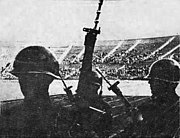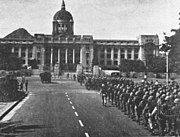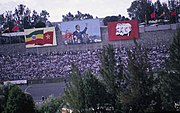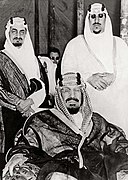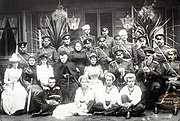Talk:Dictatorship/GA1
GA Review
[edit]| GA toolbox |
|---|
| Reviewing |
Article (edit | visual edit | history) · Article talk (edit | history) · Watch
Reviewer: Grnrchst (talk · contribs) 12:17, 19 December 2022 (UTC)
Ok, I'm going to take this review on. I just want to preface this by saying how happy I am to see this article nominated, given how vital the subject is to our collective understanding of the world. On first glance, it appears to meet the criteria for a GA rating. Stand by for further comments, as I'll be reviewing this section-by-section. --Grnrchst (talk) 12:17, 19 December 2022 (UTC)
- Thank you for taking this one on, especially considering its broad scope. This was actually my introduction to working on vital articles, so I'm looking forward to building on it. I don't expect it to be an easy one, but I'll get started on going through all of your notes. Thebiguglyalien (talk) 15:29, 19 December 2022 (UTC)
Lead
[edit]- Consider putting "or group of leaders" between a pair of commas for easier readability.
- Consider adding link to Limited government for "limitations".
- Do you have access to a paginated copy of Simon, et al (2019) or Huntington (2012)? No worries if not, as non-paginated copies are still linked here.
- "Politics in a dictatorship take place between the dictator, the inner circle, and the opposition, which may be peaceful or violent." Unclear what "inner circle" means here. Also unclear how politics in a dictatorship includes the opposition.
- Why is the "C" in "Communist"/"Communism" capitalised?
- Consider rewriting the second paragraph a bit, as its sentences are currently a little stilted and don't lead well into the next, reading more like a prosified list. E.g. "Many dictatorships fell [...]. Many dictatorships still exist."
- "Strong opposition groups can result in [...]" reads a bit strange. Consider changing to "The development of a strong opposition can result in [...]" or something similar.
--Grnrchst (talk) 12:36, 19 December 2022 (UTC)
- I've copyedited the lead and added information about the inner circle and opposition. I removed the citations entirely, as they weren't linked to anywhere in the body and appeared to be extraneous per WP:LEADCITE. Thebiguglyalien (talk) 16:22, 19 December 2022 (UTC)
- Looks good! My only comment would be to maybe break up the first paragraph a little, as it's quite long. But this is much easier to follow as an introduction to the concept. -- Grnrchst (talk) 16:56, 19 December 2022 (UTC)
Etymology
[edit]- Do you have any dictionary sources for the etymology other than the Oxford English Dictionary? Asking for the purposes of verifiability, as the OED website requires a subscription to access.
- Is there a source for the rest of the text in this section? The sentence starting with "Typically" could particularly benefit from citing a source.
--Grnrchst (talk) 12:42, 19 December 2022 (UTC)
- Looking at this section, I've decided that it's better suited to dictator instead of dictatorship, and I've moved it to that article. The paragraph will still need work on that article, but dictator as a whole needs a rewrite; maybe that will be a future project. Thebiguglyalien (talk) 16:55, 19 December 2022 (UTC)
- That makes sense. And yeah, the dictator article has needed a lot of work for some time. -- Grnrchst (talk) 16:58, 19 December 2022 (UTC)
Structure
[edit]- "Dictatorship may also be defined as a lack of democracy." I don't think this is a particularly useful definition, especially not following the text that preceded it, which defines dictatorship in clearer terms. Consider removing this sentence.
- Consider adding link to elites.
- Consider bundling the multiple citations for easier readability.
- "Scholars refer to a dictatorship as either a form of authoritarianism or totalitarianism." I think "scholars" here is a bit vague. Consider something along the lines of "Dictatorships can be categorised as either a form of authoritarianism or totalitarianism."
- Put a comma after "According to Juan Linz".
- "Building on the work of Juan Linz". Consider replacing this with either "Building on Linz's work" or "Building on this distinction". If using the latter, then move this line to the end of the preceding paragraph.
- Consider relabelling "University of Colorado at Colorado Springs" as simply "University of Colorado", for the sake of concision.
- "has examined the characteristics of authoritarian and totalitarian dictators and organized as depicted below:" The "and organized" bit reads a little strange. Perhaps "and organized them" might be clearer?
- What do "Leader as function" and "Leader as individual" mean? It's unclear.
- What are "Ends of power"? It's unclear.
- Add link to Legitimacy (political) for "Legitimacy".
- Do you have access to Totalitarianism, Social Science, and the Margins? Asking as currently a book review is cited instead of the book itself.
- If you're going to have a paragraph defining totalitarian dictatorship in this section, you should probably also have one for an authoritarian dictatorship, as the latter is currently only defined in contrast to the former.
--Grnrchst (talk) 13:10, 19 December 2022 (UTC)
- I've copyedited this section. I agree that aspects of the table are unclear, so I've removed it and left a brief summary of Linz's classification. The distinction between authoritarianism and totalitarianism seems to be Linz's own model rather than an agreed upon standard, so I have not expanded on it. Thebiguglyalien (talk) 18:45, 19 December 2022 (UTC)
- Looks good! Just noted that Juan José Linz is now linked twice within the same section, so you may want to remove one of those links. -- Grnrchst (talk) 19:29, 19 December 2022 (UTC)
Formation
[edit]- "The seizure group" reads a bit odd. Consider either "The group seizing power" or simply "The group".
- The source "Geddes, Wright & Frantz 2018, pp. 3–13" has quite a wide page range cited for this section. Consider citing more specific page ranges for each sentence.
- Per above, "seizure groups" reads a bit odd.
- "After a dictator seizes power, a political party may be formed [...]" Does this typically happen after they seize power? I know many examples of the opposite occurring - an already existing political party acting as the model for the dictatorship that they later establish.
- Again, the source "Geddes, Wright & Frantz 2018, pp. 26–31" provides quite a wide page range for an entire paragraph. Could you cite more specific page ranges for each sentence?
- What is a "rule-change"? Is this referring to regime change or a self-coup?
- "Between 1946 and 2010," this sentence currently accounts for 68% of dictatorship formations during this period. Does the source specify where the other 32% came from, or is it made up of many different causes that only account for small fractions by themselves?
- Consider adding a link to banditry.
- "Peter Alter suggests a value system perspective based on cultural & political nation, national consciousness, and nation-building." What does this mean exactly? How does this relate to the formation of dictatorships? The way it's worded currently it's unclear.
--Grnrchst (talk) 13:25, 19 December 2022 (UTC)
- I've removed the last paragraph entirely, as it was purely speculative and did not provide any information on how dictatorships are actually form. All other concerns in this section have been addressed. Thebiguglyalien (talk) 19:23, 19 December 2022 (UTC)
- Good call. -- Grnrchst (talk) 19:27, 19 December 2022 (UTC)
Types of dictatorships
[edit]- For the section header: consider the singular "Types of dictatorship" instead of the plural "Types of dictatorships".
- "[...] focuses on where the control power lies." The term "control power" reads a bit strange. Consider rewriting as simply "where power lies", "where power emanates from", or something similar.
- "According to this tradition" How is it a tradition? Isn't it a classification system?
- "single-party dictatorships are controlled by the members of a political party" is it controlled by the party's membership or by the party leadership/the party itself? Asking as the membership of some of the largest political parties account for a large percentage of the country's total population. Do all of these members exert equal control over the dictatorship?
- This section includes portraits of four living persons, with the implication that they are considered model dictators of each type of dictatorship. But currently no citation is provided that describes any of them as a "dictator", as a leader of a dictatorship or as characteristic of the specific type of dictatorship. This is a problem that has plagued the dictator article for a while, so I want to make sure we're keeping air-tight to Wikipedia's BLP policy here. If you can't find reliable sources describing these people as such, then please remove the images and try to replace with people that have been described as such in reliable sources.
- Many of the citations throughout this section currently cite broad page ranges for a lot of information. Consider using more specific page ranges for each sentence.
Military
[edit]- "one or more military officers". Consider removing the "one or more" qualifier and just have "military officers". Then correct the grammar: "holds" -> "hold", "determines" -> "determine", "exercises" -> "exercise".
- Consider linking to democracy, oligarchy and oppression for their respective mentions.
- "Military dictatorships in the past have been significantly more common in Latin America." This is already mentioned in the first paragraph. Consider removing.
One-party
[edit]- This section seems to focus on communist regimes, but other forms of party dictatorship have existed. Consider adding more information on that ground, in order to provide a bigger picture.
- "One-party states ruled by Marxist political parties [...]" Consider cutting this sentence down a little. The key point here is that party dictatorships can differ in ideology while being identical in function.
- Add a comma after "civil service" for readability.
Personalist
[edit]- What are "fruits of office"?
- "According to a 2019 study, [...]" is it necessary to specify the study here, where other parts of the section haven't?
- "its inner circle" Suggest changing the pronoun "its" to "their".
- "Many scholars" Such as who? Only one source is provided.
- "Without any checks and balances to their rule, such dictators are domestically unopposed when it comes to unleashing repression, or even starting wars." This repeats information already mentioned in the preceding paragraph. Consider removing this sentence.
- Standardise the citation formatting for Van den Bosch (2021) and Geddes (2004), as they're currently out of line with the others. Find them ISBNs if you can.
Absolute monarchies
[edit]- Consider linking to crowned republic for "ceremonial monarchy".
--Grnrchst (talk) 14:14, 19 December 2022 (UTC)
- It's difficult finding sources for non-communist one-party dictatorships, but I added what I could. For the images, I've removed most of them throughout the article, as dictator would be a better fit for images of individual dictators. I'll try to find other images that better portray dictatorship as a whole. I've addressed all other concerns except for citations. I'm not sure what the best way to format them would be, because there are a few different types of sources. Some of them are from a book that's used several times using Template:Sfn, some are from a single page in a book where using Template:Sfn would create a redundant note, and some are from journals where the article's page numbers are listed. Thebiguglyalien (talk) 19:53, 20 December 2022 (UTC)
- Changes to One-party state section look good! And aye, don't worry about the sources party, that's mostly just my own style preference. Let me know if you need help finding images, I can already think of a few that might be useful. -- Grnrchst (talk) 20:37, 20 December 2022 (UTC)
- Consistent citation formatting is one of my weaknesses and something I should work on, but yeah, it's not the main priority right now. Help with images would be great. I'm trying to find an image that captures the essence of each subsection without just resorting to a portrait, but the Nuremberg rally is the only thing that came immediately to mind. Thebiguglyalien (talk) 21:33, 20 December 2022 (UTC)
- Ok here are some suggestion images I have for this section. Per your thoughts, I attempted to find images of dictatorship rather than dictators. So for military dictatorships, I tried to find images of military power in practice rather than just grabbing images of their juntas. For party states, I found images that include party iconography and people gathered in either a rally or a congress. For personalist dictatorships, I found images of the image of the dictator being venerated, without their presence. And for absolute monarchies, I looked for images where multiple members of the royal family are included, to display succession.
- Military
- Consistent citation formatting is one of my weaknesses and something I should work on, but yeah, it's not the main priority right now. Help with images would be great. I'm trying to find an image that captures the essence of each subsection without just resorting to a portrait, but the Nuremberg rally is the only thing that came immediately to mind. Thebiguglyalien (talk) 21:33, 20 December 2022 (UTC)
- Changes to One-party state section look good! And aye, don't worry about the sources party, that's mostly just my own style preference. Let me know if you need help finding images, I can already think of a few that might be useful. -- Grnrchst (talk) 20:37, 20 December 2022 (UTC)
- One-party
- Personalist
- Absolute monarchies
- --Grnrchst (talk) 11:04, 21 December 2022 (UTC)
- These are exactly the sort of images I had in mind. I've added one for each type of dictatorship, and I also used another in the history section. Thebiguglyalien (talk) 19:03, 21 December 2022 (UTC)
- --Grnrchst (talk) 11:04, 21 December 2022 (UTC)
History
[edit]This is probably the section that I have the biggest issue with. It reads less like a historical overview of the rise of different forms of dictatorship throughout history, than a prosified list of dictatorships that have formed. I honestly think that this section needs a complete rewrite, in order to keep it focused.
Dictators in the Roman Empire
[edit]- Are there any better sources for the Roman dictator than the ones provided? They're currently cited to web pages in the Spanish language. For the sake of verifiability, consider replacing them with reliable sources in the English language. You can find a host of them in the main article for Roman dictators.
- "The dictatorship was revived 120 years later through a populist movement led by Sulla," This is a little misleading, as Sulla was the head of the aristocratic Optimates, while "populism" was associated closer with Caesar's Populares faction. Consider rewriting for accuracy.
- "under whose dictatorship the Roman Republic became the Roman Empire." Again, this is a little misleading. The transition from the Republic to the Empire was led by Augustus, not Julius Caesar. Consider rewriting for accuracy.
- Consider adding information about the various tyrants that existed in the Mediterranean during classical antiquity, as this would give a broader overview of dictatorship during this era.
Post-classical and early modern dictatorships
[edit]- It reads as odd to me that the Kamakura shogunate is mentioned, but the Ashikaga and Tokugawa shogunates aren't (instead just listed as "other shogunates"). But maybe that's just me.
- Is there a better source on the Lê dynasty than the citation in the Vietnamese language? For the purposes of verifiability, it would be better to cite an English language source.
- Why is Dutton (2006) cited three times for the same information? This is quite odd. You could very easily bundle these together as "Dutton (2006), pp. 34–37."
- Actually, consider cutting down the first paragraph for the sake of concision. I'm not sure it needs to go into this much detail in order to simply say that there were military dictatorships in Korea, Japan and Vietnam during various points in time.
- Consider bundling the multiple citations in the second paragraph for easier readability.
- How was Robespierre a military dictator? He wasn't a military officer, nor was the Committee of Public Safety a military body.
19th century dictatorships
[edit]- "personalist strongmen dictators" This is one too many adjectives for my liking. Consider using simply "personalist dictator" for conceptual consistency.
- The second paragraph reads to me like a prosified list and could easily be cut down into a single sentence without losing much necessary information. Consider cutting down for concision.
Pre-Cold War dictatorships in the 20th century
[edit]- This section also has the problem of reading like a prosified list and could very well do with cutting down for concision. I hardly think that every single dictatorship necessitates its own paragraph. Consider rewriting to provide a broader overview of the period, rather than it reading as "This dictatorship existed. Also this dictatorship existed. Also this dictatorship existed." The process of how these dictatorships formed throughout Europe is neglected in favour of simply stating the existence of each individual one.
- "the party chose Joseph Stalin to be its next leader," This is a massive oversimplification that neglects the lack of a formal process for Stalin being "chosen" as leader and the split between him and Trotsky's opposition. This could be rewritten as "power was consolidated by Joseph Stalin" for better accuracy.
- "A Soviet government was briefly established in Hungary in 1919, but it fell the same year." Then why is it notable enough to mention? This could easily be cut, with nothing of value lost. (I will note that many other Soviet governments were formed during this time, but none of them are mentioned here)
- "Benito Mussolini was the first fascist dictator." What exactly led to this? How did fascism become one of the main forms of dictatorship at this time? The broader process of the rise of fascism is far more important to discuss here than the specifics of individual regimes.
- Again, the paragraph about dictatorships in Iberia reads like a prosified list. This needs cutting down to keep the scope of the article focused on the history of dictatorship, rather than listing every dictatorship that popped up at the time.
- "Lithuania, Latvia, and Estonia were effectively ruled by the totalitarian dictator Joseph Stalin after the June 1940 Soviet invasion and occupation of the three Baltic countries during World War II." Citation needed for this. Or it could be cut in favour of mentioning that their domestic dictatorships were brought down by the implementation of Soviet rule.
- "Several right-wing dictatorships also emerged in the Balkans during the interwar period." How and why? Again, this would benefit from a broader overview than simply listing the dictatorships that arose there during this time.
- "During World War II, [...]" This whole paragraph is uncited, and again, reads like a prosified list. It neglects a broader overview of dictatorship during WWII, where it would really benefit from it - as this marks a turning point for the rise and fall of fascism in Europe.
- Again, the section about dictatorships in Latin America simply lists the dictatorships that existed, without mentioning how or why they came to power in the first place. What caused a rise in dictatorships in this region during this time? Was it related to the events in Europe?
Cold War dictatorships
[edit]- Once again, the issue of listing dictatorships without explaining the broader causes and effects of dictatorship during the Cold War persists. Why did this dictatorships arise? How were they distinguished from each other? What role did they play in the Cold War? Etc. I really don't think it's worth me giving any more notes on this section, as it would just be a repetition of this same point.
21st century dictatorships
[edit]- "There are currently over 50 dictatorships around the world." According to whom? How does this differ from the 20th century? (Are there more or less than there were during the Cold War?)
- The second paragraph falls into the same trap as the previous sections. Why have absolute monarchies been maintained in these countries but not others? How have one-party states been maintained in some states, but fallen in others? Etc.
This whole section appears to be the one that will present the biggest blocker to GA status, as it fails criterion 1 (Well-written) and 3 (Broad in its coverage). If you want me to put this review on hold until this section can be rewritten, or if you feel you can pull off rewriting this, then let me know. --Grnrchst (talk) 15:16, 19 December 2022 (UTC)
Measurement
[edit]- Why are the results of the Democracy Index detailed in length, when it isn't even mentioned in the first paragraph?
- I don't think you need to list countries considered "flawed democracies", "full democracies", etc. This article is about dictatorship, so keep the results focused on dictatorships.
--Grnrchst (talk) 15:20, 19 December 2022 (UTC)
- It's not relevant, and I've already removed it once in the past, but it was restored by an IP user. I've removed it as off topic. Thebiguglyalien (talk) 21:34, 20 December 2022 (UTC)
- Good call. --Grnrchst (talk) 11:05, 21 December 2022 (UTC)
Economics
[edit]- More specific page numbers could be provided, but this is less of an issue in this section than in others.
--Grnrchst (talk) 15:24, 19 December 2022 (UTC)
- Added more precise page numbers for the Sfn citations. Thebiguglyalien (talk) 22:08, 20 December 2022 (UTC)
Legitimacy and stability
[edit]- As before, a number of citations in this section provide large page ranges for a lot of information. As before, consider breaking up into smaller page ranges for each sentence.
- "Before 1990" It seems odd to specify a year, considering the end of the Cold War occurred as a transition over many years. Think it's better to just say "during the Cold War" or something to that effect.
- "violence is used to coerce all opposition to the dictator's rule," Is "coerce" the right word here? Wouldn't "repress" (as in political repression) be a better fit?
--Grnrchst (talk) 15:38, 19 December 2022 (UTC)
- Added more precise page numbers for the Sfn citations. Both of the other concerns are addressed. Thebiguglyalien (talk) 22:09, 20 December 2022 (UTC)
Examples
[edit]I see another user has added a lengthy "Examples" section that is just a long list of countries and their leaders. Clearly the sources they provided were unreliable, but without them you're just left with original research which sometimes violates BLP policy. I would strongly suggest removing this in its entirety. --Grnrchst (talk) 13:48, 20 December 2022 (UTC)
- I agree. I was ready to remove it entirely, but I wanted to hear a second opinion first. I've removed it. Thebiguglyalien (talk) 22:10, 20 December 2022 (UTC)
References
[edit]- I'm generally of the opinion that citation formatting should be standardised for ease of accessibility. If you're going to have some citations using shortened footnotes, then I think most (if not all) of the other citations should follow suit. I realise this is a lot of work to ask, and it's really just my preference, so feel free to ignore this if you don't agree.
- Also, the sources in the Further reading section still need formatting.
--Grnrchst (talk) 15:43, 19 December 2022 (UTC)
- Further reading section has been formatted, and I've removed some entries that were about specific dictatorships rather than dictatorship in general. Thebiguglyalien (talk) 22:19, 20 December 2022 (UTC)
Closing remarks
[edit]@Thebiguglyalien: For the most part, I think this article is excellent and it largely meets the criteria for GA, with the suggested improvements. It really is just the History section that is bringing it down for me, which is a shame, as I think it clearly stands apart in quality from the rest of the article. If you want me to put this review on hold, until the history section can be rewritten, then let me know and I'll do so. Once the problems with that section are rectified, and other comments here have been taken on board, I'll be more than happy to pass this. --Grnrchst (talk) 15:48, 19 December 2022 (UTC)
- I believe I've addressed all of the concerns listed above, and the history section is ready for a second review. Thebiguglyalien (talk) 23:32, 24 December 2022 (UTC)
- What a lovely holiday present! I'll let you know my thoughts. -- Grnrchst (talk) 08:53, 27 December 2022 (UTC)
History (rewritten)
[edit]From the off, this is clearly far better-written and more informative than the previous version. Excellent work rewriting this so quickly!
Early dictatorships
[edit]- "Republican phase of Ancient Rome" could probably be simplified to "Roman Republic".
- Add link to Sulla's civil war for context.
- Consider changing "life-long dictator" to "dictator for life"
- Remove second full-stop after footnote 63.
Pre-Cold War dictatorships in the 20th century
[edit]- I feel like this section could do with a punchier title. Not sure what to suggest right now though.
- "power was exercised by soviet councils" - This reads odd, as "soviet" is the Russian word for "council". Use either "soviets" or "councils", but not both.
- "Lenin consolidated power in 1922" - I'm not sure what this means. Is it referring to the formation of the Soviet Union? Lenin didn't really "consolidate" power in 1922, as by that point he was already very ill and had already banned factions, wound up the Red Terror and effectively won the civil war. I could maybe buy this if it said "Lenin had consolidated power by 1922" or something similar.
- Add link to to Revolutions of 1917–1923.
- Cut "at the end of the 19th century", as it makes the sentence internally contradictory with "at the same time". Keep it simply as "At the same time, nationalist movements were also growing throughout Europe."
- Cut "Among the nationalist dictatorships of Europe were the fascist dictatorships". The subsequent sentences already go on to explain that.
- Confused about "after seizing power in 1925". The March on Rome occurred in 1922. Please clarify.
- "though the application of these reforms varied and was often inconsistent". Is this detail necessary? If not, then cut. The reforms speak to the character of the regime, whether or not they were applied consistently.
- Add links to Francoist Spain and Estado Novo (Portugal) for context.
- Clarify "others" to Western Bloc or something.
- Consider cutting down "19th century dictatorships persisted [...]" to simply "Dictatorships persisted [...]"
Cold War dictatorships
[edit]- Africa section is looking good!
- Little context is given as to how the PRC and ROC split up in the first place. Consider adding a short introductory sentence about the Chinese Civil War.
- "which involved the destruction of any elements of capitalism in China" The Cultural Revolution was also aimed at traditionalism. Consider adding this detail so "elements of traditionalism and capitalism" or vice versa.
- "The Middle East was decolonized during the Cold War, and many nationalist movements gained strength post-independence." Could you go into any further detail on this? As it stands, the paragraph just goes straight into talking about Iran without connecting it either to decolonization or nationalism.
- Add links to Eastern Bloc, Dissolution of the Soviet Union and Revolutions of 1989.
- Operation Condor probably deserves a mention, as one of the main outcomes of dictatorship in Latin America during the cold war.
- I'm wondering if this section could be restructured a bit more, in order to lean away from the continental classification and more towards the character of these dictatorships. Just for example, you could do a section on decolonization and how that affected the rise of dictatorship, another section on the Eastern Bloc and the rise of communist dictatorships and another section about the anti-communist bloc and the rise of right-wing dictatorships? This is just a thought though.
21st century dictatorships
[edit]- Is there anything that can be mentioned about dictatorships in Africa, Middle East and Southeast Asia? These are the areas that dictatorships persist by-and-large, but the focus here is mostly on Lukashenko and Putin.
Anyways, this is much better than the previous iteration by a long way. This has gone from failing criteria 1 and 3 to passing both. With the above notes addressed, I would be more than happy to pass this review. Tremendous work @Thebiguglyalien: I hope you're proud of this! --Grnrchst (talk) 09:44, 27 December 2022 (UTC)
- Most of these should now be fixed. I like your suggestion about restructuring the Cold War section, but I'm not sure how it would be done. A lot of the dictatorships in a given region are tied to one another (e.g. it's difficult to talk about the Marxist dictatorship in North Korea without talking about the nationalist dictatorship in South Korea and vice versa). For the 21st century, I agree that there needs to be more coverage of other regions, but it's difficult to talk about present-day dictatorships without falling into the trap of listing individual dictatorships. I found and incorporated sources about MENA and Central Asian dictatorships, but it's surprisingly difficult to find good academic sources that talk generally about current one-party states or dictatorships in sub-Saharan Africa. Thebiguglyalien (talk) 15:45, 27 December 2022 (UTC)
- This all looks great! Thanks for taking this all on board and improving this. I'll go ahead and pass the review now. :) -- Grnrchst (talk) 15:50, 27 December 2022 (UTC)

